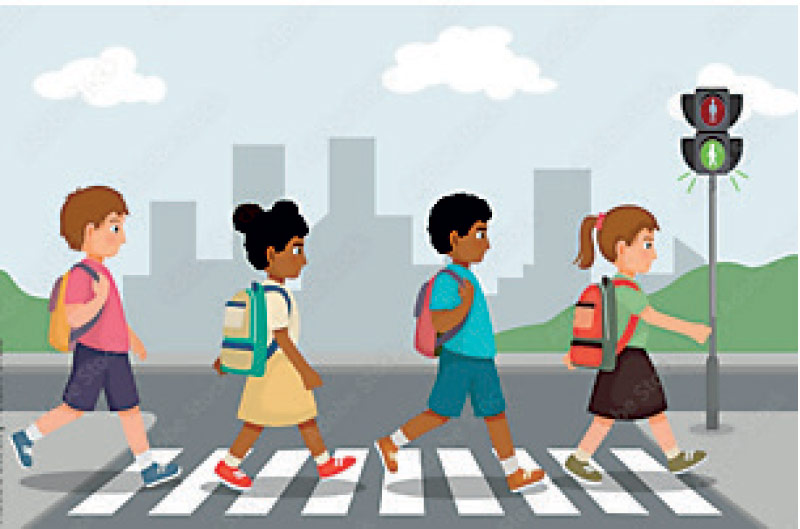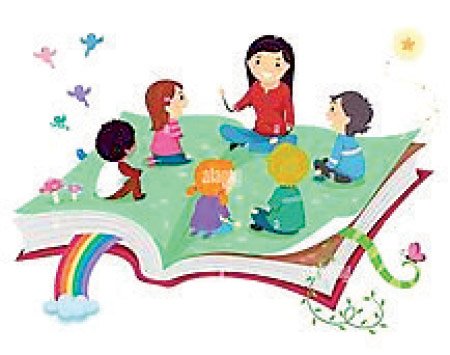Tuesday Feb 17, 2026
Tuesday Feb 17, 2026
Thursday, 4 September 2025 02:47 - - {{hitsCtrl.values.hits}}

 Understanding child psychology is critical in primary schools because young children are at crucial developmental stages. A good grasp of child psychology helps teachers guide behaviour positively, identify needs, and support healthy growth so children feel valued and motivated
Understanding child psychology is critical in primary schools because young children are at crucial developmental stages. A good grasp of child psychology helps teachers guide behaviour positively, identify needs, and support healthy growth so children feel valued and motivated
 Primary education is the bedrock for later learning and development. During early childhood, children acquire foundational skills in reading, writing and numeracy that support their ability to learn independently. Primary schools provide the first structured environment for socialisation, teamwork, communication, problem-solving and emotional regulation. They shape cognitive abilities, nurture curiosity and develop positive attitudes to learning. This holistic start equips young minds with confidence and provides tools to meet the emerging challenges.
Primary education is the bedrock for later learning and development. During early childhood, children acquire foundational skills in reading, writing and numeracy that support their ability to learn independently. Primary schools provide the first structured environment for socialisation, teamwork, communication, problem-solving and emotional regulation. They shape cognitive abilities, nurture curiosity and develop positive attitudes to learning. This holistic start equips young minds with confidence and provides tools to meet the emerging challenges.
A holistic approach to foundational learning
The British primary education plays this foundational role. It gives great satisfaction to a parent to watch children thrive in the British system. This article draws on personal observations, focusing on teaching content, support to families, assessments and teacher training. The system adopts a broad and balanced curriculum. The teaching focuses on giving pupils literacy and numeracy, knowledge and skills. The teaching approaches stimulate creativity, social development, curiosity and confidence through play-based learning. A supportive and inclusive environment helps pupils feel valued. An adventurous learning model lays a solid foundation for lifelong learning.

A broad and balanced curriculum
A broad curriculum delivers this adventurous learning. British primary curricula strike a balance between core academics and creative and practical learning. English, Mathematics, and Science form the core. Many schools teach Computing and Languages early. History, Geography, Art, Music, Design and technology, and Physical education receive emphasis. Within this broad range of offerings, subjects that combine creativity and practical skills play a special role in developing problem-solving skills and resilience. The broad curriculum and varied teaching approaches aim at the personal, emotional and social development of the child. They prevent learning from being solely exam-driven and expose children to experiences that nurture their curiosity, creativity, learning skills and confidence.
Hands-on learning: The role of design and technology
Design and Technology exemplify creative, practical learning. British primary schools empower children to become problem-solvers and inventors. Rooted in the National Curriculum, it asks pupils to identify real-world needs, then design and create functional products or systems. Activities range from building simple structures and preparing healthy foods to designing textiles and basic circuits. It teaches iteration in researching, sketching, modelling, selecting materials, and evaluating. These activities develop children’s motor skills, imagination, and understanding of links between mathematics and science to the real world. Alongside practical experiences, core subjects such as English and IT provide children with the tools to express their ideas and navigate the modern world.
Core tools for the modern world: English and IT
Design and technology provide practical skills; English and IT offer essential tools for communicating and navigating the modern world. Mastering English reading, writing, speaking, and listening is a cornerstone of a child’s education and prospects. Strong literacy underpins other subjects, critical thinking, imagination, empathy and confidence.
In our digital age, IT skills are essential. Early exposure helps children become confident, responsible and creative users of technology. They develop digital literacy that enables them to gather information, solve problems and understand the world around them. Learning basic computing concepts, coding and software use fosters logical thinking and resilience. British IT education also teaches online safety, digital citizenship and responsible use, preparing children to navigate the digital landscape securely and ethically. Academic learning of this kind is supported by policies that prioritise well-being and sensible expectations in out-of-school work.
Supporting the whole child: Homework and wellbeing
Schools prioritise children’s wellbeing and family circumstances, recognising that learning cannot flourish without social and developmental support. This philosophy is reflected in homework policies, where the British approach is often light and balanced. Primary pupils are generally not overloaded with homework, reflecting evidence that it offers limited benefits at this stage of development. Young children usually lack independent study skills without significant support; excessive homework can cause stress, disrupt sleep and strain family dynamics. Many schools prioritise the love of learning through play, reading, and creative activities that match developmental needs.
This approach also acknowledges socioeconomic disparities. Children from disadvantaged backgrounds may face barriers such as limited study spaces, technology or parental guidance, which can widen inequalities. Some schools adopt optional homework or collaborative projects, encouraging family involvement without excessive pressure. Part of meeting these needs involves clarity about who provides resources and how families are supported.
Addressing needs: Shared responsibility for resources
Schools are primarily responsible for providing textbooks and essential resources, which are funded through government allocations made via local authorities or directly to academies. This core funding is intended to cover the costs of materials for delivering the National Curriculum textbooks, reading schemes, exercise books, art supplies, and standard classroom equipment, ensuring access during school hours.
Parents typically provide personal stationery, a school bag, uniforms, and a Physical Education kit. Recognising the financial burden, support is available for families on low incomes or those receiving benefits through schemes such as School Essentials Grants or local programmers. Beyond textbooks and uniforms, schools also address broader social and health needs such as nutrition and childcare.
Free school lunches and childcare
Schools also address wider social and health needs through mostly free, nutritious lunches that meet standards, limit junk food, and ensure adequate portions of fruits and vegetables. This links to improved concentration, behaviour, attendance, and reduced health inequalities. Universal school meals are associated with improved reading skills and a reduced incidence of obesity.
To support working parents, schools offer childcare and community services, breakfast clubs, after-school programs, and holiday activities, helping families manage work commitments while enriching children’s learning. Some schools collaborate with local services and charities to offer financial or emotional support, combining educational guidance with practical childcare to bridge the gap between work responsibilities and parental involvement. In addition to meals and childcare, enrichment through clubs further extends children’s opportunities to learn and thrive.

Enrichment through school clubs
School clubs enrich and complements the formal curriculum. Activities ranging from computer coding and chess to gardening, drama, sports, and art, allow pupils to explore their talents, discover their passions, and apply their learning in real-world contexts. Clubs nurture teamwork, leadership, creativity, problem-solving, resilience and confidence, and foster inclusive communities where children build friendships across diverse groups and age cohorts. For working parents, clubs offer supervised activities that support both parents’ work and a child’s development. Breakfast clubs are especially popular, providing a nutritious meal and a safe, supervised start to the day. They help children arrive energised and ease morning pressures on families while promoting community and healthy eating. This service allows parents to drop their children off early, often from as early as 7:30 or 8:00 am, enabling them to commute to work on time without the stress of logistical conflicts or the high cost of private morning care. As pupils engage in both curricular and extracurricular activities, the system uses systematic assessment to track progress and identify where support is needed.
Tracking progress: How children are assessed
The British system continuously assesses children and trains teachers to deliver high-quality education. Assessment is continuous and multi-faceted, designed to track progress and identify needs rather than merely pass or fail pupils. Teacher assessment encompasses several methods, including daily observation, marking and questioning. Discussion is central, providing immediate feedback that allows teaching to be modified.
There are statutory national assessments, known as Standard Attainment Tests (SATs), which serve as snapshots of pupil and school performance. At the end of Year 2 (Key Stage 1, age 6–7 years), teachers use their judgement, classwork, and optional tests to assess reading, mathematics, grammar, punctuation, and spelling. The most formal tests are at the end of Year 6 (Key Stage 2, age 10–11 years) in English reading, spelling, punctuation, and grammar (SpaG) and mathematics. Results measure individual attainment and overall school performance.
Outcomes are communicated through parent-teacher meetings and an annual written report. At the end of each key stage, pupils are assessed against national standards, with descriptors such as “working towards”, “working at” or “greater depth”. The evaluation system aims to ensure every child has fundamental skills before secondary school, and these assessments are then summarised formally for parents.
Annual school reports provide an impartial summative assessment of academic progress and personal development, typically issued at the end of the summer term. They outline attainment in core subjects against expectations, highlight strengths and areas for improvement, and comment on attitude, behaviour, social skills, and participation, forming a vital tool for home-school communication. Reliable assessment depends on well-prepared teachers, so investment in teacher training and professional development is crucial.
Investing in educators: Teacher training and evaluation
Effective assessment depends on well-prepared teachers, so training and professional development are given a central place. Teacher preparation is rigorous: most teachers complete a university degree followed by a postgraduate teaching qualification or specialised training combining theory with classroom experience. Teachers engage in ongoing professional development through workshops, peer learning, and performance reviews, ensuring strong subject knowledge, classroom management, inclusive practice, and modern teaching methods.
Understanding child psychology is critical in primary schools because young children are at crucial developmental stages. A good grasp of child psychology helps teachers guide behaviour positively, identify needs, and support healthy growth so children feel valued and motivated.
Teachers are assessed using a national system focused on accountability and professional growth. Observations, alignment with Teachers’ Standards, annual appraisals, and external inspections ensure ongoing quality. Teachers also help extend learning beyond term-time through holiday provision and by making school facilities available for broader community use.
Learning beyond the classroom: Holiday camps and facilities
Learning extends beyond the classroom and term time. Holiday camps run by schools, local councils, charities, and private providers blend recreation, arts, sports, and outdoors to foster social skills, confidence and enjoyment while supporting working parents.
The physical environment of schools also shapes experiences. Classrooms with interactive whiteboards, halls for Physical education, computing resources, playgrounds, nature gardens, forest school areas, and allotments support a broad curriculum and pupil wellbeing. Among these facilities, libraries often act as community hubs.
Libraries and community hubs
Libraries serve as community hubs for literacy, offering activities like Lego clubs, gardening clubs, story times and baby rhyme sessions. They often host drop-in health and welfare services and provide family-friendly resources and free Wi-Fi, making them valuable hubs for both children and parents. Such shared spaces strengthen community ties and extend learning outside formal lessons. Alongside these amenities, practical issues like how children travel to school are also addressed.
Ensuring safety on the journey to school
Safety on the journey to school is emphasised. Schools teach the Green Cross Code and use supervised activities. Local authorities often implement 20 mph limits near schools, improve crossings and signage, and use traffic-calming measures. Initiatives like School Streets reduce congestion and enhance the air quality. Community efforts through parent surveys and workshops help identify unsafe routes and push for local solutions such as better pavements and bike paths. Safe journeys support attendance, punctuality and peace of mind for families.
Conclusion: Building confident and curious learners
From a parent’s viewpoint, the British primary education system intertwines academic rigour with holistic development. It nurtures curious problem-solvers through Design and Technology, confident communicators through English and IT, and resilient individuals through wellbeing support. This is achieved through a broad curriculum that values creativity with core skills, balanced assessment that informs rather than overwhelms, and teacher training that emphasises child psychology and continuous development.
The system recognises education as a partnership between school, child and family. By supporting working parents with childcare, nutritious meals and enriching clubs, schools build a community around the learner. This foundation prepares children academically and emotionally, fostering socially responsible, confident learners with a love of learning. While challenges remain, this holistic approach offers an example for developing well-rounded citizens.
This article does not argue for adapting the British system, or any other system, far from it. Clearly, transporting a system mindlessly does not work. However, we need to learn from what has worked and develop our own system that best suits our children. Such learning and adaptation require skills and collective efforts. It requires being responsive to the current context in the country and calls for sensitivity to the needs and perceptions of all those who matter, especially the children. We need to explore ways of doing so using established methods of identifying problems in the current system, analysing their causes and experimenting with strategic ways of eliminating those causes. The longer we delay improving our education system, the more generations of children will have their lives wasted in irreparable ways.
As Sri Lanka embarks on challenging education reforms, it would be strategic to set goals and targets in terms of the quality of education and develop evidence-informed approaches to achieve these goals. Starting with primary school is crucial, as it is a critical prerequisite for children to move into secondary education. This approach requires results-based planning, effective and evidence-informed implementation strategies, close monitoring of results for quick course correction and evaluation to ensure progress towards goals.